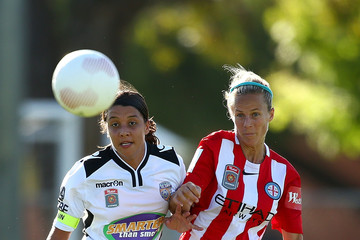
It is difficult to summarize the career of Matilda’s mid-fielder, Aivi Luik. She has done so much, achieved so much and had so many successes in so many footballing spheres that it is hard to get your head around it all.
One of her most astounding achievements was the way in which she forced her way back into the Matildas team in 2018 after spending many years (and two world cup campaigns) in the national team selection wilderness courtesy of a string of soft tissue leg injuries. Despite being regarded a veteran at the age of 34, Luik now commands enormous respect among her fellow Matildas players and demands serious consideration by the team coaches when it comes to the allocation of Matildas starting positions. If Luik continues to play the way she has in recent years she will still be pulling on the green and gold for some years to come.
Success all over the world
Aivi Luik has achieved considerable success in US college and North American semi-pro (pre NWSL) competitions, in European leagues with stints in Denmark, Iceland, Norway, Sweden, England and Spain and outstanding success in Australia, as well, with most valuable player honours and league championship victories for both Brisbane Roar and Melbourne City. See what I mean? It’s hard to imagine another player in Australian colours who has set the football world on fire in so many far-flung corners of the globe. Despite that, she is far from Australia’s most visible player. Aivi Luik, with a reputation for dedication to technique, endurance and hard work, is the archetypal unsung hero of any team she plays for.

Players like Luik sometimes don’t stand out. When surrounded by the likes of outstanding ballers Sam Kerr, Caitlin Foord, Hayley Raso and Tameka Yallop what the Matildas need in the mid field is an outstanding technician with great vision who can make great decisions and provide space and time to enable the stars to work their magic. Luik is the efficient and powerful engine that links the defensive realm with the forward line enabling it to strike at its opponents ruthlessly. She has been doing this stuff for teams all over the world for ages and will continue to do it for the Tildas until she feels the need to take a step back and continue playing the game she loves at a less serious level and at a more genteel pace. Let’s hope she isn’t in too great a hurry to step down!
As the Matildas journey towards this years Olympic Games in Japan steps up a gear with the current qualifying tournament being playing in Sydney this week (involving China, Taiwan, Thailand and the Matildas) I was thrilled that Aivi Luik agreed to answer a few of questions. Here are some thoughts from the legend about her career and football in general.
Socrates – You are currently rated by many as one of Australia’s best mid fielders. What do you put this down to?
Luik – I guess, maybe because I have a lot of experience which helps me to be able to read the game better. That combined with a good work rate and a desire to be that link player between the back line and the forwards or to switch the play from left to right in a no frills, two touch max kind of way. But honestly, there are so many good players in Australia who are very good footballers… playing with them makes you look good.
Socrates – What do you see as being the key skills of a successful mid-fielder?

Luik – You have to have technical skill to keep the ball and play it accurately to your team mates. You need to have an awareness of your surroundings to find the right space and positioning to by-pass the opposition to go forward. You need to be strong to protect the ball. You need to be able to communicate to those around you… and of course you need to have a willingness to fight and work hard.
Socrates: You said, “awareness of your surroundings to find the right space and positioning.” Other than lots of experience, were there specific things that you did in training (drills, exercises, activities) that helped you to develop this high level of vision and spatial awareness required to be a great mid-fielder?
Luik – There are drills that help with this. Something as simple as having a defender play you the ball that you need to pass to a moving target player in one or two touches. To do this you must position yourself side on, look over your shoulder before you receive the ball so that you can see where your target forward is and then play them the ball. The target should be moving to test whether you have checked to see where they are on the field.
“A sporty background…”
Socrates – Was there something that made a huge difference to your game that you didn’t expect or didn’t see coming? I am particularly interested in this question because I suspect that, for some people, big improvements or changes can result from activities that come from surprising areas.
Luik – As a kid it was two things that helped… but these are unsurprising – 1. Having a very sporty background in general and participating in gymnastics helped to build my motor skills base. 2. Just playing every day in the street or in the backyard with my siblings. That repetition helped built a good technical ability and situational awareness.
As an older player, there are two things that have surprised me – things I don’t think you can fully appreciate until you go through them yourself. That is 1. Returning to play after being out with a long-term injury. With this, you have a renewed appreciation and love for playing the game which in turn gives you extra motivation and energy, all of which help you play better and stand out. And 2. When you’re really happy off the field it transfers into the way you play and that’s when you play your best. And vice versa of course. That sounds obvious enough but until you experience it you can’t fully understand it or how much of an effect it has.

Socrates – Did your US college experience help you to improve your game?
Luik – I think it helped add to my work rate and mental toughness because they drill “hustle” into you. I also think it helped me because, at that time, without it, I wouldn’t have been able to play consistently at a higher level because there was no W-League in Australia.
Socrates: For an ambitious young player would you recommend a few years in US college football or are young players better off looking for opportunities to play pro in Europe or Asia or the States.
Luik – I think it depends on what the player is after. If you want to earn a degree while playing at a pretty high level, then the US college system is a great way to go about it because you will be doing both and it’ll be practically free with a scholarship. The US College system was a great experience for me. I have lifelong memories and friends because of it, and I would recommend it to almost every player.
If the player isn’t so interested in an education, then it might be more worth their while to go straight to play at a club overseas where they can focus solely on football whilst also getting paid for it.
Different lessons from different leagues
Socrates – Few players have spent as much time overseas as you have. England, Norway, Denmark, Spain, Iceland etc. Has playing overseas helped your game? Have different leagues helped you develop your game in different ways?
Luik – Definitely. It’s been an absolute blessing to have been able to play in so many different leagues around the world. Each has been a new experience and taught me different things. For example, the leagues in Iceland, Norway and England have allowed me to work on being a stronger player. The leagues in Spain and Denmark have helped me technically. With Spain, the language barrier was something that also improved my spatial awareness because without the usual communication in English, I was forced to look around me a lot more than usual.
Socrates – What are the downsides of playing overseas?
Luik – Missing your family and friends and missing out on life events and just being there for them if they need you. Those have always been the biggest things.
Socrates – Are you keen to play in the NWSL? Has that ever been an ambition?

Luik – After college in America, playing professionally in the US was initially something that I thought I would probably do but after 4.5 years of college football and then a year and a half there playing semi-professionally because there was no professional league, I was ready for something new. After playing in Europe for so many years I love the football and the lifestyle and I think it’s more suited to me so in the end, probably not, but I wouldn’t take it off the table completely.
Socrates – What is the biggest technical flaw of ambitious young footballers?
Luik – Oh, blasting shots rather than placing them for sure!
“You don’t see a lot of Rugby players diving…”
Socrates – Are there aspects of other sports that you think football could learn from?
Luik – I think a lot of Football players can learn to have a tougher attitude and display more pride in their on-field reaction to tackles. You don’t see a lot of Rugby players or American Football players diving, yelling out, rolling around on the ground and faking injury. It’s something that I’d love to see gone from the sport.
Socrates – Will you still be playing in five years? Who (or where) would you like to be playing in five years’ time?

Luik – Ha-ha, only God knows the answer to that one. I think it’s pretty safe to say that I won’t be playing at a high level anymore, but I am looking forward to playing foot volley at the beach, table football, indoor football, head tennis, 7v7…these types of football.
Socrates – Who is your favourite athlete (from any sport) in the world and why?
Luik – It’s hard to pick just one but I’d say Ronaldinho is one of my favourites because of how technically gifted he is and because of the way he holds himself; he plays with pure passion and love and always has a smile on his face. I also suspect he’d be a good team mate as well.
Socrates – When you say you admire Ronaldinho “because of the way he holds himself” would you be able to expand upon that aspect of his game and persona just a little?
Luik – I admire his attitude and persona on the field. He is a very passionate player who clearly loves what he does, and I think his positive vibes would be very catching amongst his teammates. You can feel his joy and passion when you watch him on TV.


Leave a Reply